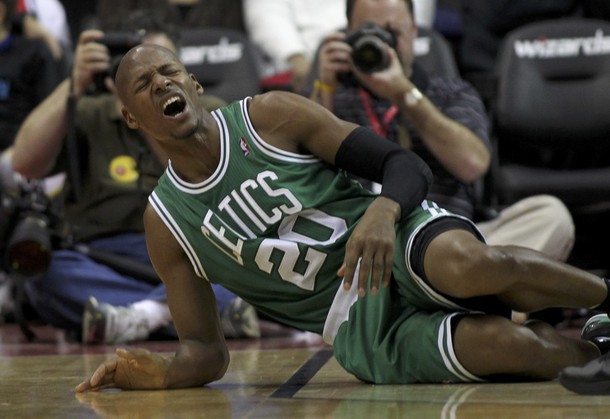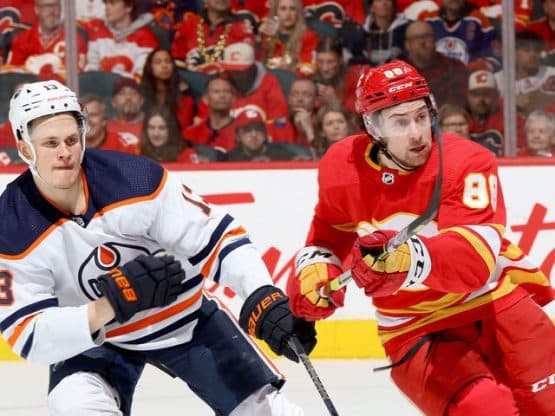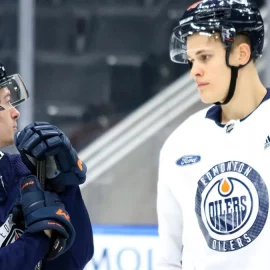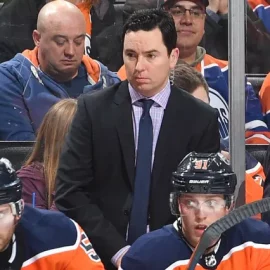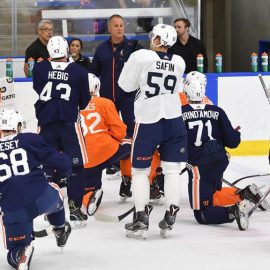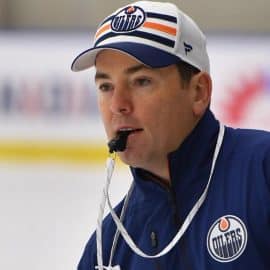https://www.youtube.com/watch?v=jYQxnTYC-YE
Sunday evening Justin Schultz became yet another former Oiler to find success on another team, this time winning the Stanley Cup after being traded (some would say run out of town) to the Pittsburgh Penguins at the deadline for a 3rd round pick.
During the playoffs, when it became clear that Schultz was going to be vying for a championship, there had been some discussion among Oiler fans that they would cheer for the Sharks to win because the idea of Justin Schultz hoisting the Cup after spending several years toiling in futility in Edmonton was just too galling.
Here’s something we need to think about when it comes to Justin Schultz’s time in Edmonton: not all of the failures we associate with the player are the responsibility of that player.
Radical thought, I know.
Of course Schultz has to wear some of the blame for his performance here, but there are a lot of circumstances that went into the end result of his time in Edmonton.
Schultz signed here as the pre-eminent college free-agent in the spring of 2012–almost exactly four years ago–at a time when Edmonton was a laughing stock of the league. (Okay, maybe not that much has changed). The rebuild was off track (ahem); the team would select 1st overall for the third consecutive time, tying the NHL record (also held by the Quebec Nordiques for the years 1989, 1990 and 1991). They would fire coach Tom Renney just as he appeared to be gaining some traction with the roster. Meanwhile the management group of Steve Tambellini, Kevin Lowe and the soon-to-be-re-introduced Craig MacTavish would spend the summer with mixed results–adding Ryan Smyth and extending Taylor Hall and Jordan Eberle, while also signing or re-signing Darcy Hordichuk, Dane Byers and Yann Danis.
Schultz was a bright point of light after several years of darkness and he arrived during a summer when it seemed things might finally be breaking in our favour.
That fall Schultz, Nugent-Hopkins, Hall and Eberle would spend the first half of the season in Oklahoma City playing in the AHL where Schultz would become the first rookie in the history of the AHL to win the Eddie Shore award for outstanding defenceman.
Arguably the only time the Oilers did right by Schultz was during his AHL stint, an assignment that was presumably contrary to management’s original intentions.
When the NHL season began in January of 2013, Justin Schultz was leaned on heavily, playing an average of 21:27 a night and scoring at a 0.56 ppg pace over the abbreviated 2013 season.
The following year was when things would begin to unravel. Under a new head coach and with new management in place, Schultz’s ice time would increase to 23:21 and 22:37 minutes per game over the 2013-2014 and 2014-2015 seasons, respectively. By the end of his 3rd NHL season, Justin Schultz had played only 203 NHL games but was averaging 22:28 minutes a game. The number of rookie defencemen who can come into the league and play those kinds of minutes without faltering are few and far between.
His 2nd season, which is a crucial developmental step for any player, was spent under the tutelage of an over-matched and overwhelmed rookie head coach in Dallas Eakins.
Justin Schultz was arguably never put into a position to really succeed during his time with the Oilers. He was miscast from the beginning, placed in a position of too much responsibility under an addled defensive scheme that confused even NHL veterans, and working within a woefully assembled blueline corps.
So as Oiler fans, what use is it to jeer or gnash our teeth at Schultz’s success with the Penguins? The time to be angry was years ago, and the people to blame are now removed from the positions they held when they made those errors.
Take a moment to examine the response of Leafs fans or media at the spectacle of Phil Kessel hoisting the Stanley Cup. Observe their response and know that their experience in this regard is far, far more damning than anything resembling what we might have had with Schultz.
The Leafs traded away the picks that became Tyler Seguin, Dougie Hamilton and Jared Knight for Phil Kessel–only to then have him traded away, after several agonizing years of organizational futility–for a collection of players and picks, the most rewarding being Kasperi Kapanen and the 30th overall pick in this year’s draft. For Leafs fans they have essentially sat and watched as a franchise center and top-pairing right-handed defenceman were sent away for the draft pick of a Stanley Cup champion and a prospect trending as a depth winger.
But that isn’t the half of it.
Kessel was perceived by many in the media at first as the potential saviour of the franchise and then shortly afterwards as the symbol of all it’s failures.
Sound familiar?
Watch the fan and media reaction surrounding Kessel and then decide for yourself how you want to be seen to respond to Justin Schultz winning the Cup by those outside Edmonton.
I’m not saying that every Leafs fan is going to go ballistic and become unhinged over watching Phil Kessel. Many will understand that he was never put in a place to succeed with the Leafs and that his leaving was something that had to be done. They will wish him well and say that the team did well to get some value from a player whose reputation within the city and media had become suffocating and toxic. But deep in the gears of that media machine that is Toronto, a furious rumble can be heard.
Sound familiar again?
For my part, while I found Schultz to be a frustrating player to watch and had long ago decided that it would be best for both player and franchise if he moved on, I cannot bring myself to do anything other than be happy that this young man went from such an unfortunate situation here in Edmonton to a championship ring.
I can do this without taking anything away from my hopes and dreams for the Oilers.
So congratulations to Justin Schultz on his Stanley Cup win. Many deserving men have gone their whole careers without and I know you will cherish this moment.
To the Oilers, I would say that there are several things they need to learn from this experience:
1. All players need a good supporting cast, even the generational ones. No one player is going to save the organization if they continue to make poor, short-sighted roster decisions.
2. There is a difference between a skilled young prospect and a skilled young player. The job of management does not end when you add a talented player. Rather, it is only beginning, because you must then add another good player, and another. A team is a collection of individuals whose whole is greater than the sum of their parts because every individual has the support of those around them. Part of management’s job in identifying talent is to also identify what it requires by way of coaching and mentoring in order to fully develop. This has been an area of weakness for the Oilers for decades now.
3. The mistake on Justin Schultz was not in trading him at the deadline, but in how he was perceived by previous management and how he was used as a player by the previous coaching staff. Distancing the ego of the observer and finding the courage to admit errors is a crucial factor in successfully managing a team. In this case the hockey operations people who believed that Schultz would become a top-pairing defender and their stubbornness in refusing to move off that position.
4. Justin Schultz’s limitations were partially self-imposed and had this been recognized sooner a coaching/mentoring solution might have been prescribed, or a decision made to move the young player before his value around the league further declined. Again, stubbornness, perhaps by both management and player, stood in the way of what was best for team and individual.
We are likely moving towards another young player departing the team this summer, whether that be Nail Yakupov or one of the core players, and depending on who is traded, we may only have experienced a dress-rehearsal for this kind of frustration and regret. Best to practice putting our best foot forward now.
Add The Sports Daily to your Google News Feed!
